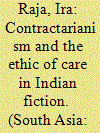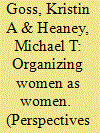|
|
|
Sort Order |
|
|
|
Items / Page
|
|
|
|
|
|
|
| Srl | Item |
| 1 |
ID:
120706


|
|
|
|
|
| Publication |
2013.
|
| Summary/Abstract |
Through close readings of recent fiction from English, Hindi and Kannada sources, this paper analyses the feminist ethic of care with reference to adult daughters caring for their critically-ill or dying mothers. The discussion focuses on problems associated with the care ethic and examines some of its assumptions, particularly its inability to account for the emotional complexity of adult caregiving relationships, which can make the invocation of relationality difficult; its focus on responsiveness to needs, such as those of helpless infants, which prevents adequate engagement with ideas of reciprocity; and, finally, its extraction of the caregiving relationship from the network of social and familial relationships in which it is embedded. Alongside my critique of the ethic of care, I will also examine the extent to which mainstream moral concepts, such as rights and contracts, may continue to be relevant to the dynamics of intergenerational relations in old age.
|
|
|
|
|
|
|
|
|
|
|
|
|
|
|
|
| 2 |
ID:
155757


|
|
|
|
|
| Summary/Abstract |
Framed within a discussion of boundary work and its many facets, this article develops a critical understanding of the discourses that shape the material and symbolic hierarchies of power asserted by employers of domestic workers in Indian households. We analyze the nature of discourses that are mobilized in the boundary work practiced by different groups of employers in India as they negotiate their relationships with their domestic workers. Drawing on fieldwork in Mumbai and Chennai, our analysis outlines two different discourses within the nature of boundary work – one centered on the trope of benevolent maternalism and another which mobilizes a market-based trope – and delineate how these diverge and converge in the relationship between employers and domestic workers. We also show how these discourses differ according to two key factors: on the one hand, whether the employers hire full-time or part-time workers, and on the other hand, the specific positional attributes of the employers in terms of age, occupation, and family background. We argue that these two discursive categories are not watertight compartments, but are located on a spectrum, and that employers therefore exhibit elements of both maternalism and market-based approaches within the relationship with their workers.
|
|
|
|
|
|
|
|
|
|
|
|
|
|
|
|
| 3 |
ID:
096276


|
|
|
|
|
| Publication |
2010.
|
| Summary/Abstract |
The Million Mom March (favoring gun control) and Code Pink: Women for Peace (focusing on foreign policy, especially the war in Iraq) are organizations that have mobilized women as women in an era when other women's groups struggled to maintain critical mass and turned away from non-gender-specific public issues. This article addresses how these organizations fostered collective consciousness among women, a large and diverse group, while confronting the echoes of backlash against previous mobilization efforts by women. We argue that the March and Code Pink achieved mobilization success by creating hybrid organizations that blended elements of three major collective action frames: maternalism, egalitarianism, and feminine expression. These innovative organizations invented hybrid forms that cut across movements, constituencies, and political institutions. Using surveys, interviews, and content analysis of organizational documents, this article explains how the March and Code Pink met the contemporary challenges facing women's collective action in similar yet distinct ways. It highlights the role of feminine expression and concerns about the intersectional marginalization of women in resolving the historic tensions between maternalism and egalitarianism. It demonstrates hybridity as a useful analytical lens to understand gendered organizing and other forms of grassroots collective action.
|
|
|
|
|
|
|
|
|
|
|
|
|
|
|
|
|
|
|
|
|